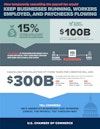Right now, amid the worst health care crisis our nation has faced in generations, businesses and workers are grappling with unprecedented disruptions. It’s important to remember that the lost productivity, lost sales, and lost revenue aren’t just financial and accounting figures — they represent serious threats to jobs and careers, families and livelihoods.
On Monday, the U.S. Chamber of Commerce proposed three ideas to help combat those threats, support American businesses and workers, and mitigate job losses amid the coronavirus pandemic. Specifically, the Chamber called for legislation that would:
- Cancel payment of all payroll taxes typically paid by employers for March, April, and May.
- Expand and streamlining loan programs for small businesses with fewer than 500 employees experiencing revenue loss as a result of the Coronavirus.
- Enable the creation of credit facilities to provide loans and loan guarantees to employers with more than 500 employees experiencing significant revenue loss as a result of the Coronavirus.
"We have a simple principle at the Chamber,” U.S. Chamber Executive Vice President and Chief Policy Officer Neil Bradley said in an interview on CNBC on Monday. “No individual and no business should go bankrupt simply because of a disruption in revenue during this crisis.”
Let’s take a closer look at that first proposal — the three-month suspension of the payroll tax employers pay to the federal government. That move would go a long way to keep workers working and paychecks flowing to American families during this crisis.

How? Each month, under the current law, employers remit more than $100 billion to the federal government in the form of Social Security, Medicare, and unemployment taxes. Collectively, these taxes add just over 15% to the cost of employing the average employee. In other words, if your employer sends you a $1,000 paycheck, they turn right around and send Uncle Sam a $153 check.
Temporarily cancelling the collection of those taxes will reduce the cost for employers of continuing to pay employees regardless of whether those employees are working or on sick leave, and regardless of whether their factories are running, stores are open, or customers are buying. Said another way, the move increases liquidity for employers to help them respond to losses in revenue.
Further, for small and midsized businesses — those with fewer than 500 employees — cancelling the taxes combined with the refundability for paid sick and family leave included as part of the Families First Coronavirus Response Act — which the House passed in the earlier morning hours on Saturday and which the Chamber supports — will provide meaningful additional financial support.
The U.S. Chamber recommended these policy actions in addition to the Families First Coronavirus Response Act that Congress passed Friday. The bill includes paid emergency leave with two weeks of paid sick leave and up to three months of paid family and sick leave for businesses with less than 500 employees. The U.S. Chamber’s policy proposals would build on this legislation to provide relief for workers and businesses facing economic hardship because of the coronavirus outbreak.
American businesses and workers are the lifeblood of our economy, and the U.S. Chamber will continue to advocate for policies that will keep Americans employed, prosperous, and healthy.
For more resources on how businesses, workers and families can navigate the challenges posed by the coronavirus outbreak, visit our coronavirus prevention toolkit: https://www.uschamber.com/coronavirus-response-toolkit
About the authors

Kaitlyn Ridel
Kaitlyn Ridel is the former Senior Director of Digital Content at the U.S. Chamber of Commerce.

